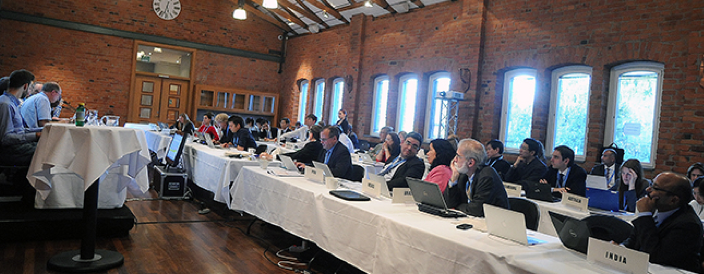 26 September 2013: The 12th session of Working Group I (WGI) of the Intergovernmental Panel on Climate Change (IPCC) focused on finalizing its contribution to the Fifth Assessment Report (AR5) titled, ‘Climate Change 2013: The Physical Science Basis.’
26 September 2013: The 12th session of Working Group I (WGI) of the Intergovernmental Panel on Climate Change (IPCC) focused on finalizing its contribution to the Fifth Assessment Report (AR5) titled, ‘Climate Change 2013: The Physical Science Basis.’
The 12th session of WGI of the IPCC and the 36th session of the IPCC were held from 23-26 September 2013, in Stockholm, Sweden. The meeting brought together over 400 participants, including representatives from governments, the UN, and intergovernmental and observer organizations, and drew worldwide media attention.
Over four days and nights, the overview of the Summary for Policymakers (SPM) was subject to intense line-by-line discussion by representatives of 116 governments present in Stockholm. The process to prepare the AR5 was launched by the IPCC in 2008. The WGI contribution is the first in the series of four reports with: the WGII assessment on impacts, adaptation and vulnerability scheduled for finalization in March 2014; the WGIII contribution on options for mitigating climate change to be finalized in April 2014; and the AR5 Synthesis Report to be completed in October 2014. The AR5 will provide the scientific basis for future global climate policy, including the new agreement that is supposed to be adopted by parties to the UNFCCC in 2015.
In their consideration of the SPM, delegates were assisted by short informal presentations by the Coordinating Lead Authors (CLAs) on various sections and topics of the SPM. At the end of the meeting, WGI approved the SPM and accepted the underlying report including the Technical Summary and annexes.
The SPM indicates that it is now clearer than ever that human influence is affecting the climate system, with the certainty of anthropogenic climate change increased from 90% in the AR4 to 95% in the AR5. Atmospheric concentrations of carbon dioxide, methane and nitrous oxide have increased to “unprecedented” levels in at least the last 800,000 years. Carbon dioxide concentrations have increased by 40% since pre-industrial times, and this was primarily due to fossil fuel emissions and secondarily due to net land-use change emissions.
The WGI report also reflects on: major changes in the Arctic and Antarctic, including on an ice-free Arctic in the summer; increased weather and climate extreme events; ocean acidification; and more scientifically robust, higher projections of sea level rise compared to AR4.
Subsequently, the IPCC convened to formally adopt the work by WGI. [IISD RS Meeting Coverage] [Publication: Summary for Policymakers] [Meeting Website] [WMO Press Release]